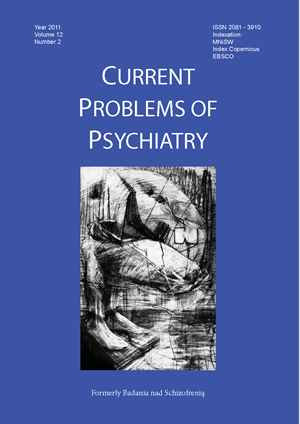Relacje z rodzicami a zaburzone postawy wobec odżywiania się u dziewcząt będących dziećmi alkoholików
Słowa kluczowe:
zaburzenia odżywiania, uzależnienie od alkoholu, rodzinaAbstrakt
Celem pracy było udzielenie odpowiedzi na następujące problemy badawcze:
- czy i jakie różnice występują w zakresie zaburzonych postaw wobec odżywiania u dziewcząt będących i niebędących dziećmi alkoholików?
- czy i jakie różnice występują w zakresie relacji z rodzicami u dziewcząt będących i niebędących dziećmi alkoholików?
- czy i jakie zależności występują między postawami wobec odżywiania się a relacjami w rodzinach dziewcząt będących dziećmi alkoholików?
Grupa badana i metody: Badaniami objęto grupę 216 dziewcząt, w wieku od 16 do 19 roku życia, które były uczennicami liceum ogólnokształcącego. Diety oraz środki przeczyszczające stosowało 30 dziewcząt, a samą dietę stosowało 58 uczennic. Dziećmi alkoholików były 23 dziewczęta, spośród których 30% przyznawało się do stosowania diet i środków przeczyszczających. W pracy zastosowano: Kwestionariusz socjodemograficzny oraz autorstwa Beaty Pawłowskiej Kwestionariusz do Badania Zaburzonych Relacji w Rodzinie (KBZRR) i Kwestionariusz do Badania Zaburzonych Postaw Wobec Odżywiania (KZPWO).
Wyniki i wnioski: Na podstawie przeprowadzonych analiz statystycznych sformułowano następujące wnioski:
- Dziewczęta, których rodzice są uzależnieni od alkoholu są przekonane, że mama byłaby bez nich samotna, że potrzebuje ona ich opieki, pocieszenia, rad, ochrony przed ojcem oraz charakteryzuje je obraz matki jako osoby nieszczęśliwej w małżeństwie i bezradnej wobec problemów, jakie niesie życie.
- Dziewczęta, których rodzice są alkoholikami, nie chcą być takimi kobietami, jak ich matki.
- Uczennice będące dziećmi alkoholików charakteryzuje znacząco większe nasilenie poczucia przygnębienia, braku celu i sensu życia, pustki, beznadziejności, bezradności, bezwartościowości, nienawiści do siebie, braku sił do pokonywania trudności, samotności oraz mają większe problemy z nazywaniem własnych emocji.
- Stwierdzono znaczące zależności między doświadczaniem przez badane dziewczęta w rodzinie przemocy, braku akceptacji, nadmiernych kar i wymagań oraz odrzucenia ze strony rodziców a stosowaniem przez nie środków przeczyszczających, prowokowaniem wymiotów, nadużywaniem alkoholu, dokonywaniem samookaleczeń oraz poczuciem przygnębienia, beznadziejności, bezwartościowości, braku sensu życia i nienawiści do siebie.
- Poczucie odrzucenia przez rodziców współwystępuje ze stosowaniem restrykcyjnych diet, ścisłą kontrolą wartości kalorycznej produktów spożywczych oraz negatywnym obrazem własnego ciała.
- Im bardziej dziewczęta – dzieci alkoholików – pragną spełnić oczekiwania i wymagania rodziców, tym większy odczuwają lęk przed dorastaniem, samodzielnością oraz charakteryzuje je nasilone przekonanie, że mama bez nich byłaby samotna, że potrzebuje, aby córka opiekowała się nią, ochraniała przed ojcem, udzielała rad i rozwiązywała problemy.
- Im częściej dziewczęta będące dziećmi alkoholików doświadczają w rodzinie przemocy, im bardziej starają się chronić matkę przed ojcem alkoholikiem, tworząc z nią koalicję oraz czują się przez rodziców odrzucone, tym częściej uczą się z Internetu nieprawidłowych zachowań żywieniowych.
Bibliografia
1. Pawłowska B. Zaburzenia odżywiania u kobiet w kontekście zmiennych psychologicznych i społecznych. Lublin 2007. Rozprawa habilitacyjna.
2. Pawłowska B., Masiak M. Porównanie danych socjodemograficznych pacjentek z anoreksją typu restrykcyjnego i bulimicznego hospitalizowanych w Katedrze i Klinice Psychiatrii AM w Lublinie w latach 1993-2003. Psych. Pol., 2007; 41(3): 351-364.
3. Pawłowska B., Masiak M. Porównanie danych socjodemograficznych i relacji w rodzinach kobiet z bulimią. Psychiatr. Pol., 2007; 41(3): 365-376.
4. Laporte L., Marcoux V., Guttman H.A. Characteristics of families of women with restricting anorexia nervosa compared with families of normal probands. L’Encéphale, 2001; 27(2): 109-119.
5. Minuchin S., Baker L., Rosman B.L., Liebman R., Milman L., Todd T.C. A conceptual model of psychosomatic illness in children. Family organization and family therapy. Arch. Gen. Psychiatry, 1975; 32(8): 1031-1038.
6. Minuchin S., Rosman B.L., Baker L. Psychosomatic Families. London: Harvard University Press; 1978.
7. Selvini-Palazzoli M. Self-Starvation. London: Human Context Books; 1974.
8. Selvini-Palazzoli M. Die Familie des Anorektikers und die Familie des Schizophrenen: Eine transaktionelle Untersuchung. Ehe ¾, 1975; 107-116.
9. Selvini-Palazzoli M. Self-Starvation: from individual to family therapy in the treatment of anorexia nervosa. New York: Jason Aronson; 1978.
10. White M. Anorexia nervosa: a transgenerational system perspective. Family Process, 1983; 22(3): 255-273.
11. Weber G., Stierlin H. Familiendynamik und Familientherapie der Anorexia nervosa - Familie. Meermann R. Hrsg. Anorexia Nervosa. Schattauer, Stuttgart; 1981, 108-115.
12. Pawłowska B., Potembska E. Właściwości psychometryczne Kwestionariusza do Badania Zaburzonych Relacji w Rodzinie (KBZRR). Curr. Probl. Psychiatry, 2010; 11(2): 119-126.
13. Pawłowska B., Potembska E. Właściwości psychometryczne Kwestionariusza do Badania Zaburzonych Postaw Wobec Odżywiania (KZPWO). Bad. Nad Schizofr., 2009; 10(10): 272-285.
Pobrania
Opublikowane
Numer
Dział
Licencja
Prawa autorskie (c) 2011 Autorzy

Praca jest udostępniana na licencji Creative Commons Attribution-NonCommercial-NoDerivatives 3.0 Unported License.


